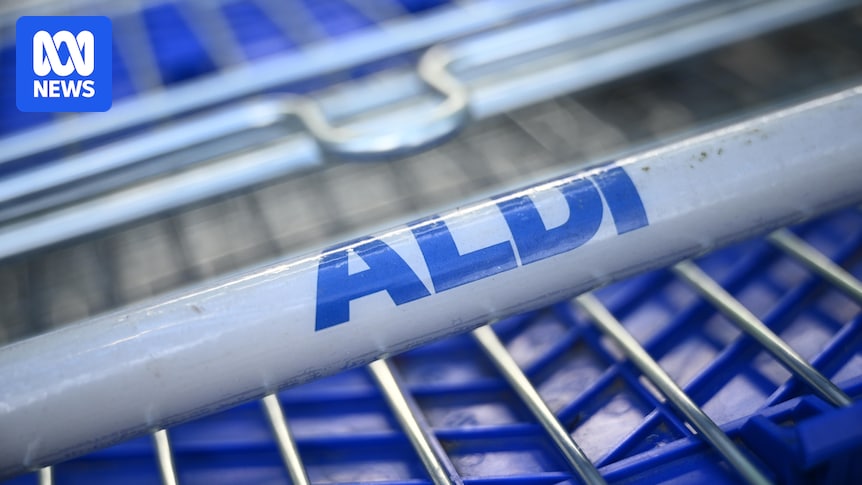When Jasmine saw an online advertisement for a $140 tumble dryer from Aldi, she thought it was a bargain.
It was just what the Sydney woman, who asked we change her name, needed for the house she had recently moved into.
But the tumble dryer never arrived — she had fallen for a scam.
“I feel dumb,” the 31-year-old told ABC News.
“I’ve always been conscious and cautious about online scams.”
The part-time worker at a veterinary clinic had been caught out by a ‘clone’ website, where a fraudulent site impersonates a legitimate brand.
“I put keywords on Google and kept scrolling down, and stumbled upon this dryer shown on Aldi,” Jasmine said.
“It [the website] looked so convincing, and I put the dryer in my cart and paid for it with Apple Pay because I didn’t want to put my bank details in.
Jasmine thought her dryer was on the way. (Supplied)
“I even checked with my co-worker before ordering, asking her, ‘Do you think this site looks legit?’, and she said, ‘Yes.'”
At the time Jasmine bought the dryer, she was asked to download a tracking app after the payment was made.
Four days later, Jasmine discovered that the website from which she had purchased the dryer could not be reached.
Online shoppers may have come across fake websites for brands that do not exist at all, but the National Anti-Scam Centre described ‘clone’ websites as a distinct type of scam.
“Clone shopping websites closely mimic the look and branding of legitimate retailers to deceive consumers, whereas fake websites may not replicate a real brand but still operate with the intent to scam,” it said.
Have you had a similar experience with scams or do you know more about scams? Confidentially contact our journalist on li.yiying@abc.net.au
The watchdog urged consumers to always verify the people they were dealing with before taking any action.
Google removes ads after questions
As recently as last week, a Google search showed half of the sponsored tumble dryers on the top of the page were from fraudulent websites.
The advertisements had been removed after the ABC approached Google for comment.
Half of the sponsored tumble dryers showed on Google last week were from fraudulent websites. (ABC News: Yiying Li)
An Aldi spokesperson said the company was aware of “some websites impersonating ALDI” and it had been “actively pursuing their removal to protect our customers”.
“We have been in contact with the ACCC and its National Anti-Scam Centre, and we are working with organisations like Google to remove potential avenues that scammers are exploiting,” the spokesperson told the ABC.
“DoorDash is the only platform that sells ALDI supermarket products online in Australia.”
Nearly $40 million in financial losses from online shopping scams have been reported since 2020. (ABC News: Cason Ho)
Google Shopping ads are served up to customers in search results, often featuring at the top of the page and showcasing product images, prices and a link to purchase.
The search engine giant told ABC News it was committed to protecting its clients from scams.
“Protecting users is our top priority and we have strict shopping ads policies that govern the types of shopping ads we allow on the platform,” a Google spokesperson said.
“If we find shopping ads that violate these policies, we swiftly remove them.”
He said in this instance, the team investigated and removed the shopping advertisements flagged, as well as taking action against the advertiser accounts behind them, for violating policies.
Nearly $40 million in financial losses have been reported from online shopping scams since 2020. (AAP: Joel Carrett)
Online shopping — the most reported scam type
Thuy Pham-Henderson, a marketing lecturer at UWA Business School, said online shopping scams were alarmingly common and under-reported in Australia.
“Under-reporting is common — victims may feel embarrassed or assume nothing can be done, so a lot of scams fly under the radar.”
Buying or selling scams, including false billing and online shopping scams, were the most common, affecting about 308,000 Australians in 2023-24, according to William Milne, head of crime statistics at the Australian Bureau of Statistics.
My identity was stolen and I only found out by chance
‘This was up from the 200,000 victims in the previous financial year,’ said Mr Milne.
Dr Pham-Henderson said vigilance and verification were more important than ever as scammers were continually evolving their tactics to outsmart defence.
The Australian Competition and Consumer Commission (ACCC) deputy chair, Catriona Lowe, agreed and warned that scams had become more sophisticated.
“Technology is helping scammers reach more people than ever before, and we see scams becoming more sophisticated and harder for people to detect.”
In the first half of 2025, Scamwatch received more than 6,300 reports of financial loss to shopping scams — the highest of any scam type — according to the National Anti-Scam Centre (NASC).
NASC’s latest data has also revealed that Australians have reported financial losses of more than $39.8 million from online shopping scams since 2020.
Loading…

